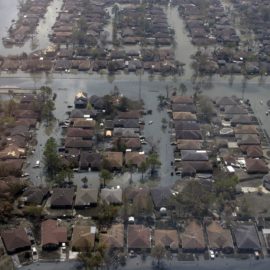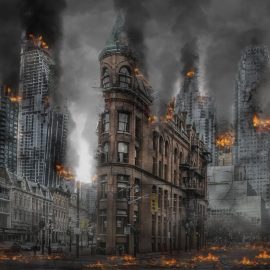
The UN’s Climate Report is out and Bob Marshall has problems with it and New Orleans.
Last month New Orleans crossed a historic benchmark. The Big Easy was given a new, more accurate nickname. Welcome to life in “The Big Risky.” That’s the verdict from the latest report by the Intergovernmental Panel on Climate Change, the collection of the world’s greatest climate scientists charged with explaining future living conditions on the planet as rising greenhouse gas emissions disrupt the natural systems our cultures, lifestyles and economies were built upon. Their new vision for the city and region if emissions are not tamed was beyond grim. The headline on the report in this newspaper was unambiguous: “Climate change poses existential threat to south Louisiana: U.N. report.” “Existential” — as in a mortal threat.
A bleak belief. Are we that bad or is there something we can do?
The risks justifying that warning were distilled from the report by my colleague Mark Schleifstein. They should be mandatory reading for your elected officials because they will decide if we take the actions necessary to make a liveable future here possible. More intense hurricanes moving more slowly at landfall, delivering the sort of damage wrought by Hurricanes Katrina, Rita, Laura, Delta, and Ida. Ocean heat waves and a northward move of fish species, combined with increased saltwater intrusion, that will threaten the state’s existing fisheries. Faster sea level rise, potentially overwhelming communities outside hurricane levees and threatening levees’ abilities to protect from the most dangerous surge. Storm surge, increased rainfall rates, and winds repeatedly wreaking havoc on homes, businesses, roads, and electric power systems. Increased temperatures and humidity that will pose a health threat to those working outdoors, children, the elderly, and the poor. An increase in other health threats including diseases presently limited to more tropical settings. An increase in mental health issues, including post-traumatic stress disorders and suicides. Disruptions in the ability of governments and residents to afford the dramatically increasing costs of climate change.
What a listing! Is there no help for us? Since we know what might hurt us we should be able to come up with some solutions.
There is only one way to lessen these impacts: quickly reducing emissions from fossil fuel use. None of this should be news to politicians whose responsibility is to serve and protect their communities. Scientists have been warning of the looming disasters for more than a decade. Those warnings have been validated by drowning shorelines, bigger storms, burning forests and record droughts. If anything, the severe impacts have been larger and happening much sooner than expected. The history of Louisiana’s Coastal Master Plan charts that rapid change. When released in 2007 the agency’s computers predicted if all the plan’s projects were completed on schedule, the state could be building more land than it was losing in aggregate by 2067. The plan was updated every five years to reflect new knowledge and changing realities. In 2012 the computers made the same hopeful prediction: We could change the equation by 2067. But in 2017, the computers had bad news. Now the best-case scenario sees the state losing another 1,200 square miles of its coastal region by 2067. The worst case shows it losing 2,800 square miles in that time. This will happen even if all the projects are completed on time. The reason: Sea level rise projections have skyrocketed because emissions continued to soar. The best-case scenario can only be reached if the world reduces emissions by about 40% over the next 10 years.
Not an easy esolution to the “oil state” controlled by a party that still wants to drill, drill, drill. Also we, the world, are in it together. Imagine the emissions that are coming from Eastern Ukraine!
That can’t be done on a purely voluntary effort. It will require stiff mandatory government regulations, many of which will cause financial hardships for industries and consumers. Unfortunately, most politicians in this state are in the GOP, whose policy is fighting to reduce or avoid the pain for the fossiel fuel industries producing the emissions. But every delay they accomplish pushes this city and region closer to that warning from the hard facts contained in the science and visible in the world around us. That strategy is why have gone from The Big Easy to The Big Risky. They should start thinking about what the next nickname could be.
A sobering article and one that should raise the issue to a higher level but not in Baton Rouge.



